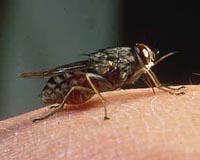 |
Paris (AFP) May 12, 2011 Health campaigners said on Thursday a new front had opened in the three-decade war on AIDS after a study among couples showed early use of drugs slashed the risk of HIV infection through sex by 96 percent. "It's a game-changer," Michel Sidibe, executive director of UNAIDS, said in an interview with AFP. "I am completely amazed." Antiretroviral drugs can deliver a double blow by suppressing HIV in an infected patient and helping to prevent its spread through intercourse, he said. He predicted a rethink of the strategies that have evolved since the first cases of AIDS were recorded in June 1981. "The implications are multiple," said Sidibe. "However, money will be the major challenge." Tasks include encouraging HIV testing and administering early treatment to people with the virus, especially in at-risk population niches such as gay men, intravenous drug users and sex workers, he said. Margaret Chan, director general of the UN's World Health Organisation (WHO), said the study was "a crucial development". "The findings from this study will further strengthen and support the new guidance that WHO is releasing in July to help people living with HIV protect their partners," Chan said in a press release. Throughout the history of AIDS, the pendulum of policymaking has swung between treatment, essentially drugs, and prevention, essentially the condom. But this to-and-fro doctrinal debate was challenged in January 2008 by a Swiss researcher, Bernard Hirschel. He ventured that someone who had observed a drug regimen and was shown to have suppressed the virus in his or her blood was no longer an infection risk through sex. Some activists scorned the findings as premature or even irresponsible. But vindication came on Thursday with data from the first randomised clinical trial, carried out among "discordant" couples, one of whom had the virus while the other was HIV-negative. The probe was conducted at 13 sites in Africa, Asia and the Americas among 1,763 couples, 97 percent of whom were heterosexual. In the first group, the HIV-positive partner received anti-HIV drugs immediately; in the second, the HIV-positive partner deferred treatment until he or she had reached a given level of viral infection. The US National Institutes of Health (NIH) reported when an HIV-infected partner began immediate antiretroviral treatment and adhered to it, there was a 96-percent fall in HIV transmission. Jean-Francois Delfraissy, director of France's National Agency for AIDS Research (ANRS), described the study as "a really important moment for public health". Delfraissy cautioned, though, the sexual behaviour among heterosexual couples -- and adherence to drug therapy -- could not be applied to all population groups. "It's one more argument for stopping the epidemic by treating all HIV-positive people so that they do not transmit the virus," commented Bruno Spire of the French advocacy group Aides. "It's marvellous news... another piece of evidence to favour using treatment as prevention," said Francoise Barre-Sinoussi, part of the French team that won the Nobel prize for identifying HIV. But she and the other watchdogs warned against any letup in prevention. Each day, more than 7,000 people are newly infected with HIV, including 1,000 children. In addition, Delfraissy observed, "there aren't the means to treat everyone". The UN has set a target of zero new infections by 2015. By that time, 13 million people, according to current clinical guidelines, will need drugs; at present, only six million have access to them. Money, though, is tight. Resources have remained at under 16 billion dollars a year since late 2007. AVAC, a New York-based group for HIV prevention, said the study highlighted the success of the revolutionary drugs that emerged in the mid-1990s and are now a lifeline for millions. Antiretroviral treatment is a combination of drugs that can reduce the level of virus in the blood to below detectable levels. But, for some patients, it can also have toxic or distressing side-effects. Designed primarily as a treatment, antiretrovirals are now being tested for prevention, as a pill taken by gay men at risk of unsafe sex and as a vaginal gel for women. Early data from these trials is encouraging. AIDS has claimed more than 25 million lives and more than 60 million people have become infected since the disease was first recorded in 1981. Around 80 percent of new infections occur through sex, according to UN figures.
Share This Article With Planet Earth
Related Links Epidemics on Earth - Bird Flu, HIV/AIDS, Ebola
 Vanderbilt biologists discover a new class of insect repellent
Vanderbilt biologists discover a new class of insect repellentNashville, TN (SPX) May 10, 2011 Imagine an insect repellant that not only is thousands of times more effective than DEET - the active ingredient in most commercial mosquito repellants - but also works against all types of insects, including flies, moths and ants. That possibility has been created by the discovery of a new class of insect repellant made in the laboratory of Vanderbilt Professor of Biological Sciences and ... read more |
|
| The content herein, unless otherwise known to be public domain, are Copyright 1995-2010 - SpaceDaily. AFP and UPI Wire Stories are copyright Agence France-Presse and United Press International. ESA Portal Reports are copyright European Space Agency. All NASA sourced material is public domain. Additional copyrights may apply in whole or part to other bona fide parties. Advertising does not imply endorsement,agreement or approval of any opinions, statements or information provided by SpaceDaily on any Web page published or hosted by SpaceDaily. Privacy Statement |